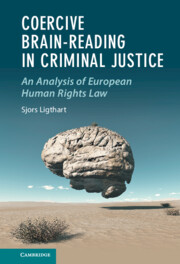Book contents
- Coercive Brain-Reading in Criminal Justice
- Law and the Cognitive Sciences
- Coercive Brain-Reading in Criminal Justice
- Copyright page
- Contents
- Tables
- Acknowledgements
- Abbreviations
- 1 Setting the Stage
- 2 Brain-Reading Technologies
- 3 Coercive Brain-Reading and the Prohibition of Ill-Treatment
- 4 Coercive Brain-Reading and the Right to Respect for Private Life
- 5 Coercive Brain-Reading and the Rights to Freedom of Thought and to Freedom of Expression
- 6 Coercive Brain-Reading and the Privilege against Self-incrimination
- 7 Procedural Implications of Brain-Reading in Breach of the ECHR: Excluding Unlawfully Obtained Evidence?
- 8 Discussion and Perspectives
- 9 Concluding Observations
- Bibliography
- Index
4 - Coercive Brain-Reading and the Right to Respect for Private Life
Article 8 ECHR
Published online by Cambridge University Press: 25 August 2022
- Coercive Brain-Reading in Criminal Justice
- Law and the Cognitive Sciences
- Coercive Brain-Reading in Criminal Justice
- Copyright page
- Contents
- Tables
- Acknowledgements
- Abbreviations
- 1 Setting the Stage
- 2 Brain-Reading Technologies
- 3 Coercive Brain-Reading and the Prohibition of Ill-Treatment
- 4 Coercive Brain-Reading and the Right to Respect for Private Life
- 5 Coercive Brain-Reading and the Rights to Freedom of Thought and to Freedom of Expression
- 6 Coercive Brain-Reading and the Privilege against Self-incrimination
- 7 Procedural Implications of Brain-Reading in Breach of the ECHR: Excluding Unlawfully Obtained Evidence?
- 8 Discussion and Perspectives
- 9 Concluding Observations
- Bibliography
- Index
Summary
Emerging neurotechnology offers increasingly individualised brain information, enabling researchers to identify mental states and content. When accurate and valid, these brain-reading technologies also provide data that could be useful in criminal legal procedures, such as memory detection with EEG and the prediction of recidivism with fMRI. Yet, unlike in medicine, individuals involved in criminal cases will often be reluctant to undergo brain-reading procedures. This raises the question of whether coercive brain-reading could be permissible in criminal law. Coercive Brain-Reading in Criminal Justice examines this question in view of European human rights: the prohibition of ill treatment, the right to privacy, freedom of thought, freedom of expression, and the privilege against self-incrimination. The book argues that, at present, the established framework of human rights does not exclude coercive brain-reading. It does, however, delimit the permissible use of forensic brain-reading without valid consent. This cautionary, cutting-edge book lays a crucial foundation for understanding the future of criminal legal proceedings in a world of ever-advancing neurotechnology.
Keywords
- Type
- Chapter
- Information
- Coercive Brain-Reading in Criminal JusticeAn Analysis of European Human Rights Law, pp. 68 - 111Publisher: Cambridge University PressPrint publication year: 2022

